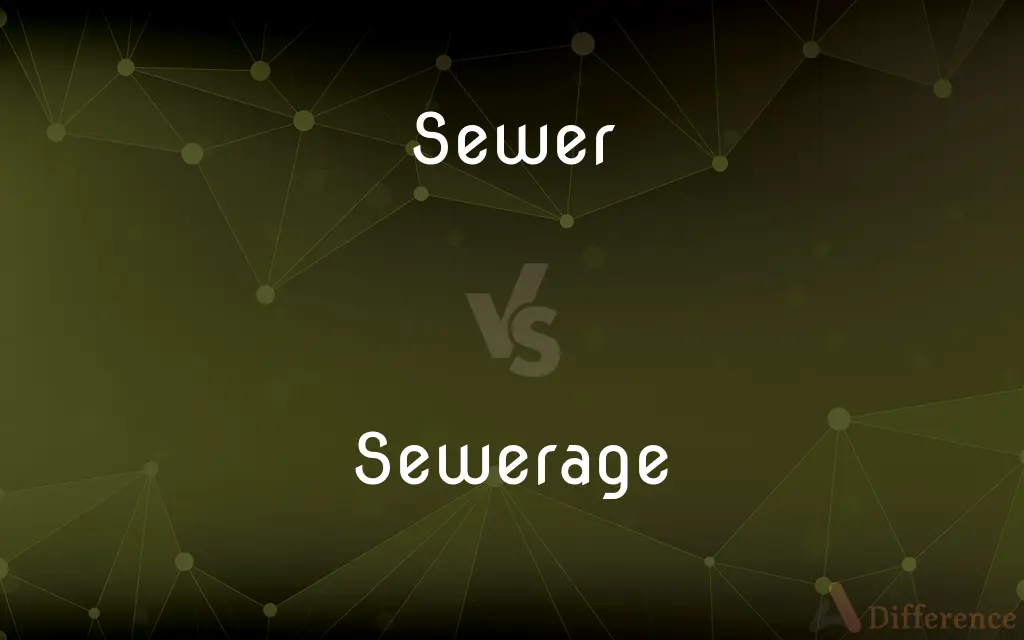Sewer vs. Sewerage — What's the Difference?
Edited by Tayyaba Rehman — By Urooj Arif — Updated on April 6, 2024
A sewer is a pipe system that carries wastewater, while sewerage refers to the overall infrastructure for waste disposal.

Difference Between Sewer and Sewerage
Table of Contents
ADVERTISEMENT
Key Differences
Sewers are underground conduits designed to transport wastewater from homes and businesses to treatment facilities. Sewerage, on the other hand, encompasses not just the network of sewers but also the facilities for treating wastewater, the processes involved in treatment, and the disposal or recycling of the treated water.
One primary difference is in their scope and function. Sewers are specific pathways for conveying wastewater, operating as part of the larger sewerage system. This system includes all the infrastructure and technological processes needed for wastewater treatment and disposal. Essentially, while sewers are the physical structures for wastewater flow, sewerage is the systematic approach to handling this wastewater.
Sewers play a direct role in public health by removing waste materials from public and private spaces, thereby reducing exposure to disease-causing organisms. Sewerage contributes to public health on a broader scale by treating the wastewater to prevent environmental contamination and protect water quality in rivers, lakes, and oceans.
The development and maintenance of sewers are crucial for the efficiency of the sewerage system. Properly designed and maintained sewers ensure that wastewater reaches treatment facilities without leaks or overflows, which can lead to environmental pollution. Conversely, an effective sewerage system depends on a comprehensive network of sewers, treatment plants, and disposal or reuse methods to safeguard public health and the environment.
Comparison Chart
Definition
Pipes or conduits for carrying off sewage.
The system of sewers and the treatment and disposal of sewage.
ADVERTISEMENT
Scope
Limited to the physical network of pipelines.
Includes the entire infrastructure for waste management.
Function
Transports wastewater to treatment facilities.
Manages, treats, and disposes of or recycles wastewater.
Component of
A part of the sewerage system.
The broader system that includes sewers.
Public Health Impact
Directly removes waste from environments to reduce disease exposure.
Treats and disposes of wastewater to prevent environmental contamination.
Compare with Definitions
Sewer
Part of public sanitation infrastructure in urban areas.
Sewer construction is essential for the new residential development.
Sewerage
Infrastructure involved in the removal and treatment of sewage.
Investments in sewerage are critical for environmental health.
Sewer
A system of pipes that carries away waste water and excrement.
The city's sewers were overhauled to prevent overflow into the river.
Sewerage
The field of engineering dealing with the disposal of sewage.
She specializes in sewerage system design to improve efficiency.
Sewer
A conduit beneath the ground for carrying off drainage water and waste matter.
Heavy rain caused the sewer to back up, flooding the streets.
Sewerage
A network including pipes, pumps, and plants for waste management.
Newer sewerage technologies allow for better wastewater recycling.
Sewer
Underground channels for waste disposal.
The ancient Romans built sewers that are still in use today.
Sewerage
The planning, construction, and maintenance of sewer systems.
Engineers are exploring sustainable sewerage solutions.
Sewer
Pipes that remove sewage from buildings to treatment facilities.
A blockage in the sewer line caused sewage to back up into homes.
Sewerage
The system of sewers and wastewater treatment plants in a municipality.
The city's sewerage system is being upgraded to handle more capacity.
Sewer
An artificial, usually underground conduit for carrying off sewage or rainwater.
Sewerage
Sewerage (or sewage system) is the infrastructure that conveys sewage or surface runoff (stormwater, meltwater, rainwater) using sewers. It encompasses components such as receiving drains, manholes, pumping stations, storm overflows, and screening chambers of the combined sewer or sanitary sewer.
Sewer
A medieval servant who supervised the serving of meals.
Sewerage
The provision of drainage by sewers
A proper sewerage system
Sewer
One that sews
A sewer of fine clothing.
Sewerage
Another term for sewage
Sewer
A pipe or system of pipes used to remove human waste and to provide drainage.
Sewerage
A system of sewers.
Sewer
A servant attending at a meal who is responsible for seating arrangements, serving dishes, etc.
Sewerage
Removal of waste materials by means of a sewer system.
Sewer
One who sews.
Sewerage
Sewage.
Sewer
A small tortricid moth, the larva of which sews together the edges of a leaf using silk.
Sewerage
A network of sewer pipes that geographically transfers wastewater; a sewer system.
Sewer
(transitive) To provide (a place) with a system of sewers.
Sewerage
Misspelling of sewage
Sewer
One who sews, or stitches.
Sewerage
The construction of a sewer or sewers.
Sewer
A small tortricid moth whose larva sews together the edges of a leaf by means of silk; as, the apple-leaf sewer (Phoxopteris nubeculana)
Sewerage
The system of sewers in a city, town, etc.; the general drainage of a city or town by means of sewers.
Sewer
A drain or passage to carry off water and filth under ground; a subterraneous channel, particularly in cities.
Sewerage
The material collected in, and discharged by, sewers.
Sewer
Formerly, an upper servant, or household officer, who set on and removed the dishes at a feast, and who also brought water for the hands of the guests.
Then the sewerPoured water from a great and golden ewer,That from their hands to a silver caldron ran.
Sewerage
Waste matter carried away in sewers or drains
Sewer
A waste pipe that carries away sewage or surface water
Sewerage
A waste pipe that carries away sewage or surface water
Sewer
Someone who sews;
A sewer of fine gowns
Sewer
Misfortune resulting in lost effort or money;
His career was in the gutter
All that work went down the sewer
Pensions are in the toilet
Common Curiosities
How does sewerage impact public health?
By treating wastewater, it prevents environmental contamination and protects public health.
What is included in the sewerage system besides sewers?
Treatment plants, pumping stations, and disposal or recycling facilities.
Why is it important to maintain sewers properly?
To prevent blockages and overflows that can lead to environmental pollution.
Can sewers carry rainwater as well as sewage?
Yes, combined sewers are designed to carry both sewage and rainwater runoff.
How do urban planners integrate sewers into city infrastructure?
By designing sewer networks that align with city growth and ensure efficient waste removal.
What are some challenges faced by sewerage systems in cities?
Aging infrastructure, increasing populations, and the need for sustainable waste management solutions.
What is the main function of a sewer?
To transport wastewater and sewage from its source to treatment facilities.
What role does sewerage play in environmental protection?
It treats wastewater to remove contaminants before release into the environment.
What technologies are used in modern sewerage systems?
Advanced wastewater treatment technologies, energy-efficient pumps, and smart sensors for monitoring flow rates.
How are sewers different from storm drains?
Sewers carry wastewater to treatment facilities, while storm drains direct rainwater away from urban areas to prevent flooding.
Can the terms sewer and sewerage be used interchangeably?
No, because a sewer refers to the physical conduits, while sewerage refers to the entire system of waste management.
What future innovations are anticipated in sewerage management?
Innovations include more sustainable treatment processes, water reuse technologies, and smart sewer systems for better management.
What are the environmental benefits of an efficient sewerage system?
It reduces pollution in water bodies and helps conserve water through recycling.
How does climate change impact sewer and sewerage systems?
It increases the risk of sewer overflows and challenges the capacity of sewerage systems due to more frequent heavy rainfall events.
How do sewers affect property values?
Proper sewer infrastructure is essential for urban development, impacting property values positively.
Share Your Discovery

Previous Comparison
Capital vs. Asset
Next Comparison
Enhancer vs. PromoterAuthor Spotlight
Written by
Urooj ArifUrooj is a skilled content writer at Ask Difference, known for her exceptional ability to simplify complex topics into engaging and informative content. With a passion for research and a flair for clear, concise writing, she consistently delivers articles that resonate with our diverse audience.
Edited by
Tayyaba RehmanTayyaba Rehman is a distinguished writer, currently serving as a primary contributor to askdifference.com. As a researcher in semantics and etymology, Tayyaba's passion for the complexity of languages and their distinctions has found a perfect home on the platform. Tayyaba delves into the intricacies of language, distinguishing between commonly confused words and phrases, thereby providing clarity for readers worldwide.














































